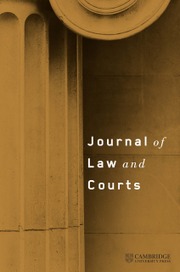Article contents
Latinos’ Knowledge of the Supreme Court
Published online by Cambridge University Press: 21 October 2022
Abstract
There is convincing evidence that Americans have high, stable levels of knowledge about the Supreme Court. Yet, this conclusion masks variance in political knowledge associated with ethnicity. Using data from surveys of Latinos and non-Latinos fielded before and after the Supreme Court’s rulings in Arizona v. United States and National Federation of Independent Business v. Sebelius, we find Latinos know less about the Court than other Americans. However, Latinos’ knowledge of the Court increased significantly between the surveys, while others’ Supreme Court knowledge did not. We discuss the implications of this result for the Supreme Court’s legitimacy and civic education policy.
- Type
- Articles
- Information
- Copyright
- © 2021 by the Law and Courts Organized Section of the American Political Science Association. All rights reserved.
References
- 1
- Cited by


